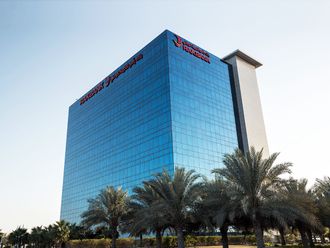London: The British government sold a 2.5 billion pound (Dh12.12 billion $3.3 billion) stake in Royal Bank of Scotland Group Plc, reducing its majority holding a decade after it bailed out the lender during the financial crisis.
The state sold 7.7 per cent in the lender at 271 pence per share to institutional investors, it said in a statement on Tuesday. Shares in the Edinburgh-based bank fell 3.4 per cent to 271.40 pence at 8:47am in London trading.
“I am pleased that the government has decided the time is now right to restart the share sale process,” RBS chief executive officer Ross McEwan said in a statement. “This is an important moment for RBS and an important step in returning the bank to private ownership.”
The divestment is the first since 2015 and comes after the Edinburgh-based bank reached a preliminary colony with US authorities over the sale of toxic mortgage bonds, which had been weighing on the firm’s valuation. The sale of 925 million shares will reduce the state holding to 62.4 per cent from 70.1 per cent, according to a statement from the government.
During the financial crisis, the UK government injected 45.5 billion pounds into RBS, then the biggest banking bailout in the world. In a milestone for the company, it recently reached a $4.9 billion preliminary colony with the US. Department of Justice over mortgage bonds, clearing the path to resume dividends and raise its appeal to investors.
CFO departure
The UK hired four US-based banks to sell the shares: Citigroup Inc., Goldman Sachs Group Inc., JPMorgan Chase & Co. and Morgan Stanley. The government has said it plans to sell about 15 billion pounds of stock over five years in equal portions of 3 billion pounds.
The government’s last sale of RBS stock was in August 2015, when George Osborne was Britain’s finance minister and Brexit had yet to roil markets. That 2.1 billion-pound sale of a 5.4 per cent stake was at 330 pence, while the stock currently trades at 280.9 pence. The government has previously indicated its break-even price on the sums injected into the bank is 407 pence a share.
Separately, the bank said last week that its chief financial officer, Ewen Stevenson, seen as a potential successor to the chief executive officer, would leave the company to pursue another opportunity. A search for a new CEO has intensified after the mortgage colony as Ross McEwan may leave as early as next year, people familiar with the discussions have told Bloomberg.
—Bloomberg












